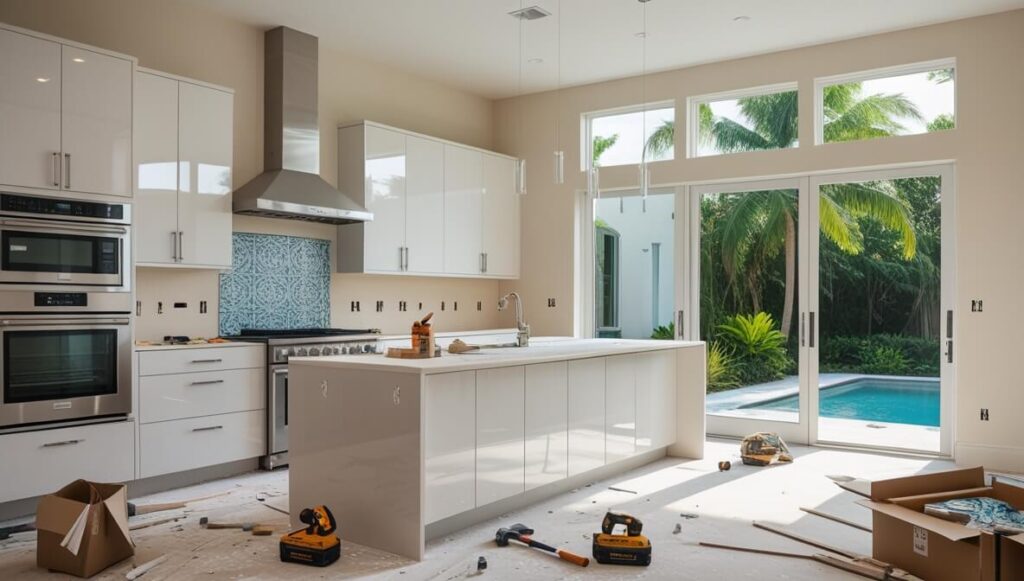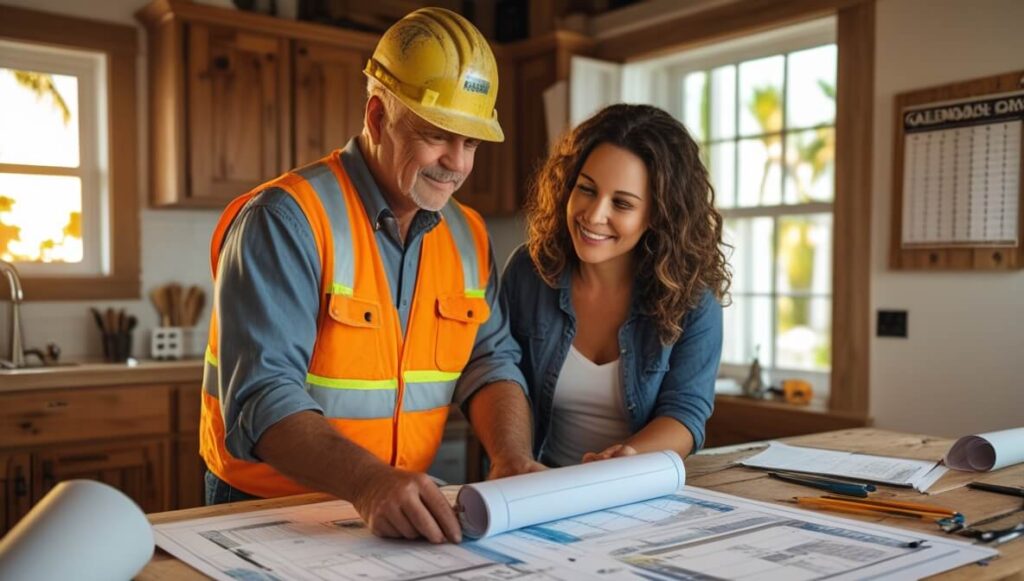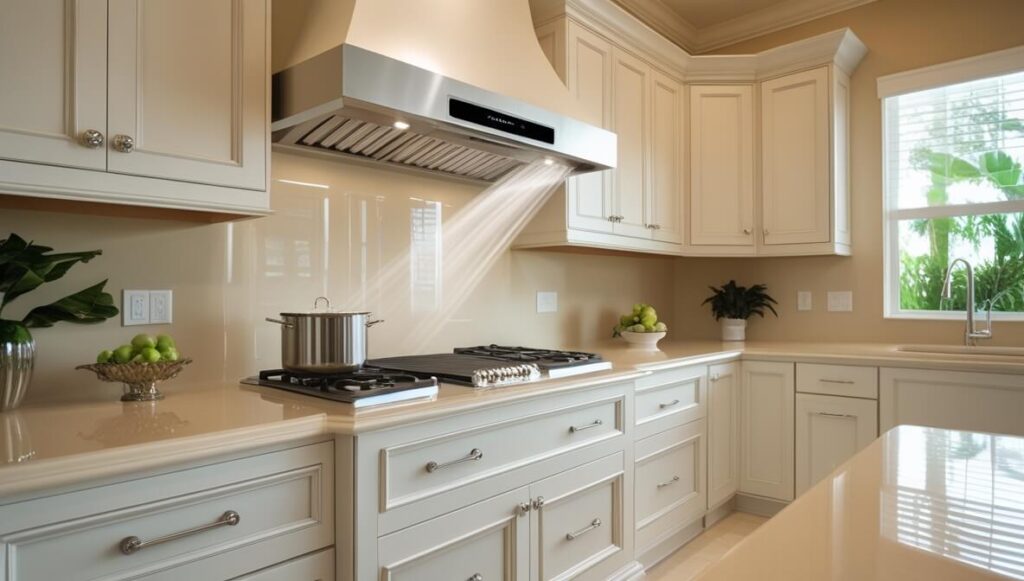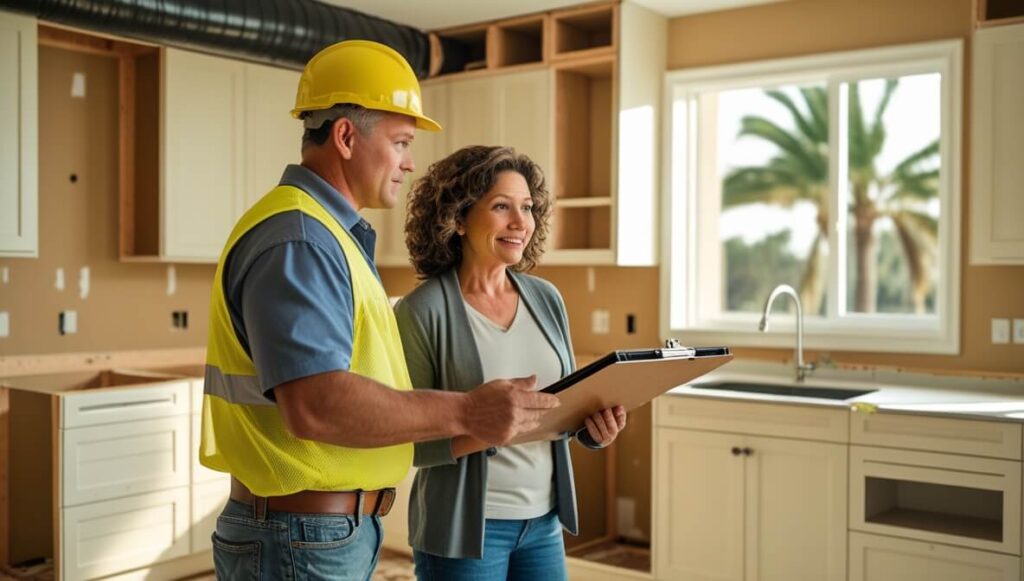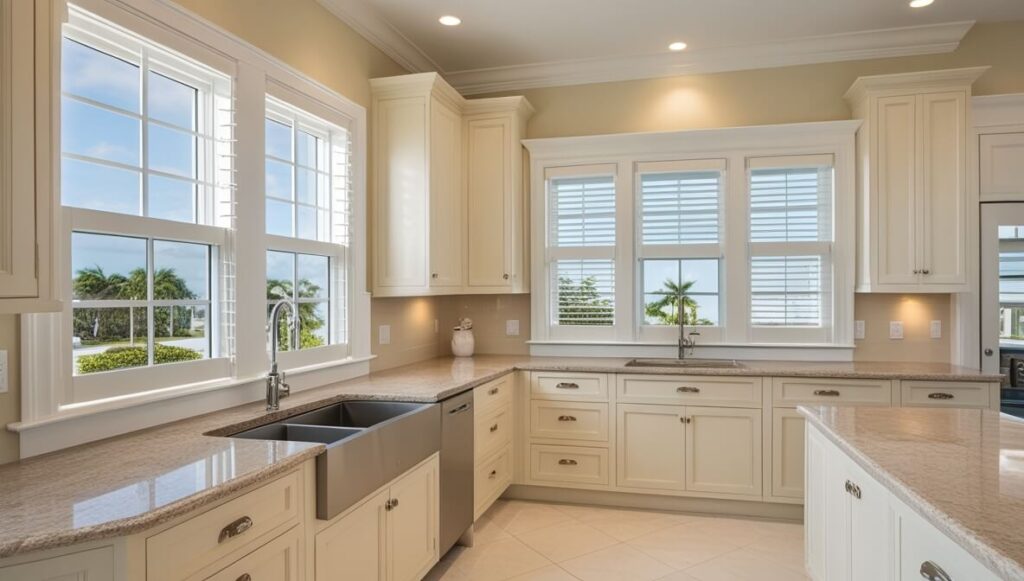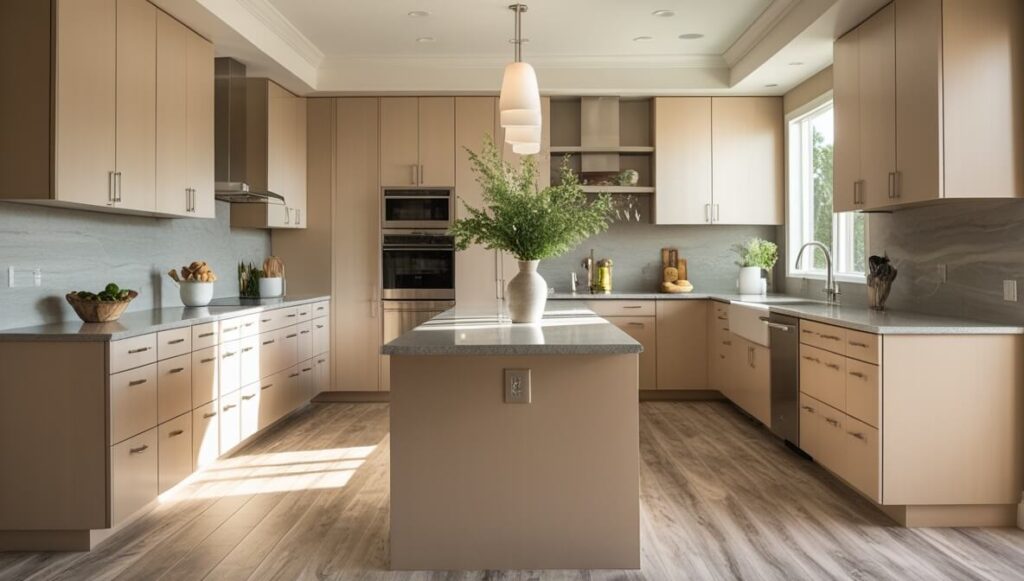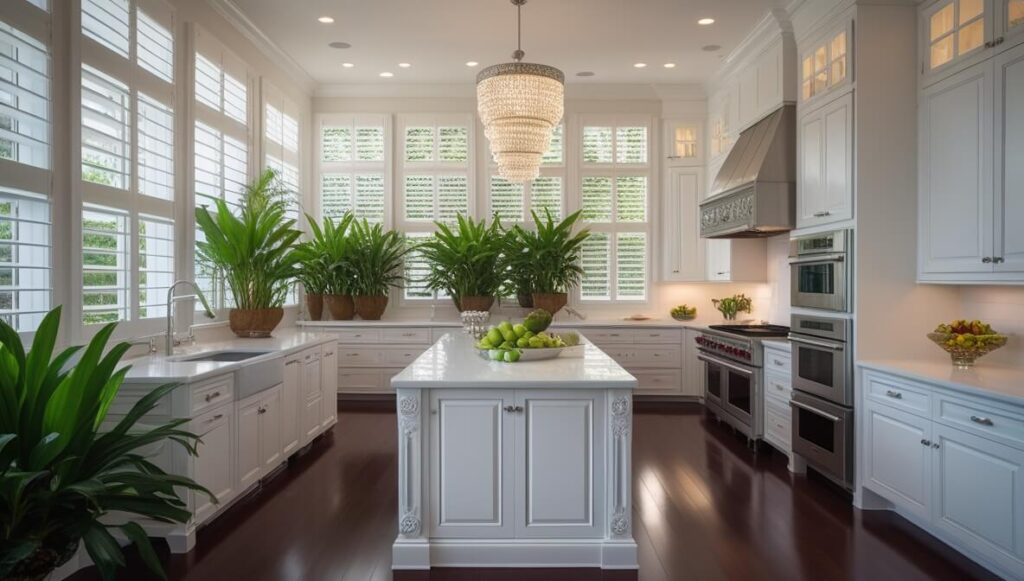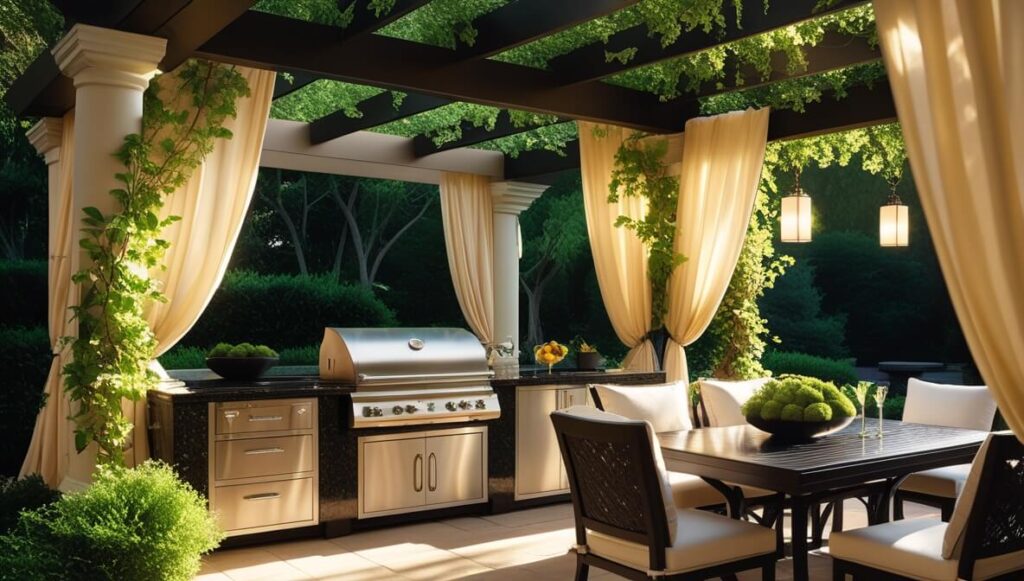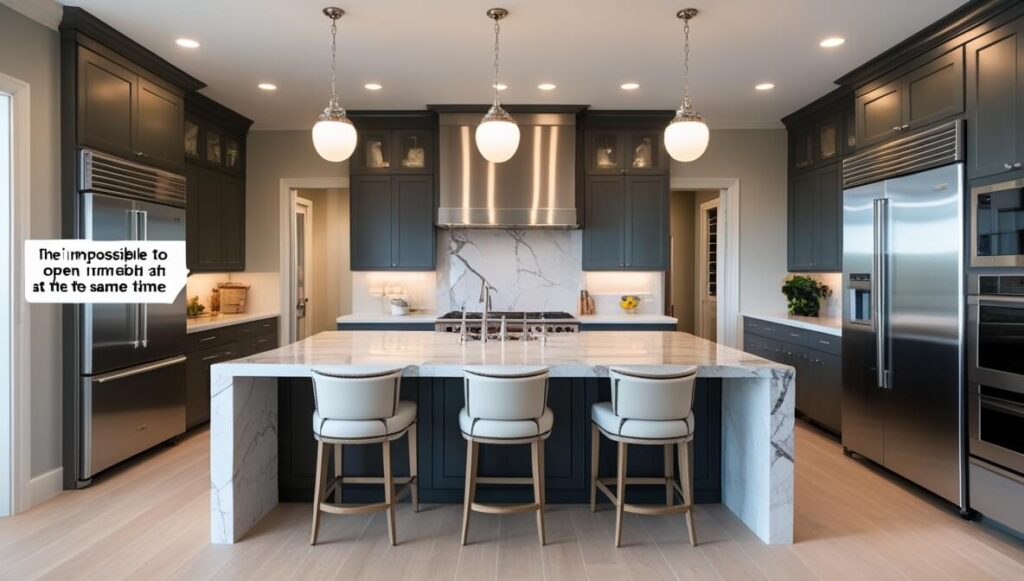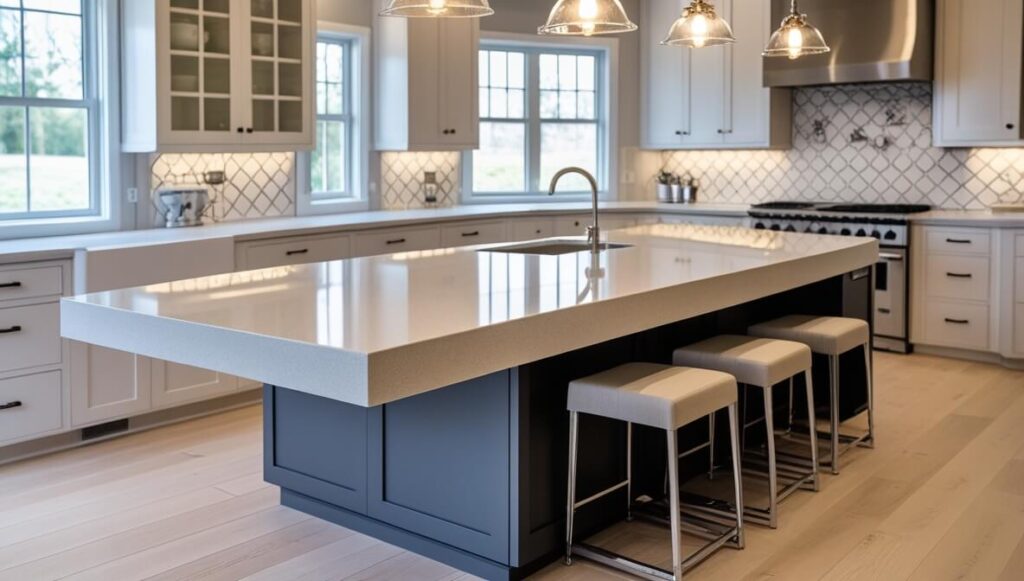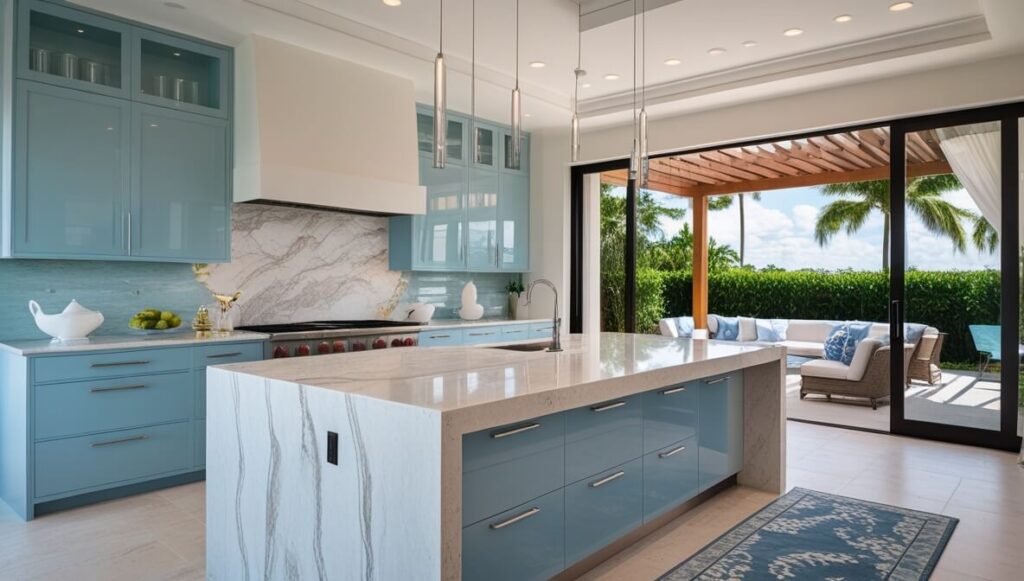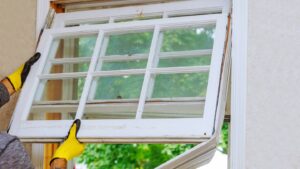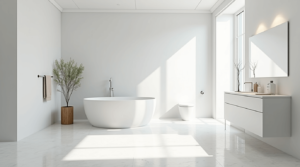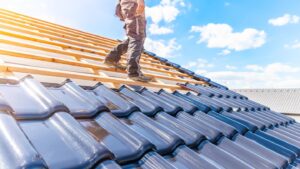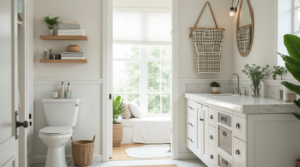I understand how overwhelming kitchen remodeling in Florida can feel when you’re navigating this significant investment. Your home faces unique challenges with our tropical climate, from the high humidity to our extreme weather patterns, and these require careful consideration in both materials and design choices. I know it can be frustrating to see that our local renovation costs typically run 15-20% above the national average due to Florida Building Commission requirements and environmental considerations. But I want to assure you that these additional costs reflect necessary adaptations that will protect your investment and ensure your kitchen stands up to Florida’s demanding climate. From moisture-resistant materials to hurricane-rated windows, each requirement serves to create a more resilient and comfortable cooking space that will serve your family well through countless summer gatherings and storm seasons. I’ve seen how understanding these regional specifics isn’t just about meeting building codes—it’s about creating a kitchen that truly works for your Florida lifestyle, where indoor-outdoor living and energy efficiency play crucial roles in your daily comfort.
Florida Kitchen Remodel Costs
Let me start with the question everyone asks first: “How much will it cost?” Based on our recent projects across Florida:
- Basic Remodel: $25,000-$40,000
- Mid-Range Remodel: $40,000-$75,000
- High-End Remodel: $75,000-$150,000+
Florida-specific costs often include:
- Hurricane impact windows: $1,000-$3,000 per window
- Enhanced ventilation systems: $2,000-$5,000
- Moisture-resistant materials: 20-30% premium
- Special permits: $500-$2,500
Pro tip: Check our How to Create a Home Renovation Budget for a detailed breakdown based on your location and specific needs.
Florida Building Codes and Permits
Getting proper permits for a Florida kitchen remodel is a critical first step that’s easy to overlook in the excitement of starting a new project. While the Florida Building Code Website provides detailed requirements, it can be overwhelming to navigate. Let’s walk through what everyone needs to know before beginning their kitchen transformation – because working with our local regulations from the start helps ensure a smooth renovation journey and protects our investment in the long run.
Required Permits
- Building Permit
- Required for any structural changes
- Cost: $150-$1,000 depending on county
- Processing time: 2-6 weeks
- Electrical Permit
- Required for any new circuits or major changes
- Cost: $100-$500
- Must use licensed Florida electrician
- Plumbing Permit
- Required for pipe modifications
- Cost: $100-$400
- Must meet Florida water conservation standards
- Mechanical Permit
- Required for HVAC modifications
- Cost: $150-$600
- Essential for proper ventilation
Visit our Florida Building Codes Guide for detailed information about your specific county.
Climate Considerations
Florida’s unique climate poses distinct challenges for kitchen design, requiring careful consideration of several critical factors. Our combination of intense heat, high humidity, frequent thunderstorms, and occasional hurricane threats creates a complex environment that demands thoughtful planning. Unlike kitchens in other regions, Florida kitchens must be built to withstand not just daily cooking activities but also the persistent effects of our tropical weather patterns. The constant interplay between outdoor elements and indoor spaces, particularly during our lengthy summer months, means that every material choice, ventilation decision, and structural element requires special attention. From the foundation to the finishing touches, understanding how our climate affects kitchen functionality isn’t just about comfort—it’s about creating a space that remains beautiful and functional despite the demanding environmental conditions we face year-round.
Humidity Control
- Moisture-resistant cabinet materials
- Dehumidification systems
- Proper ventilation design
- Mold-resistant drywall
Heat Management
- Energy-efficient appliances
- UV-resistant windows
- Proper insulation
- Cross-ventilation options
Hurricane Preparation
- Impact-resistant windows
- Secured cabinet mounting
- Backup power systems
- Water-resistant materials
Contractor Selection in Florida
Choosing the right contractor for your Florida kitchen remodel is one of the most crucial decisions you’ll make throughout this process. The success of your project—and your peace of mind—depends heavily on working with a qualified, reliable professional who understands our unique regional requirements. The Florida Department of Business and Professional Regulation has established specific guidelines to protect homeowners and ensure quality work. Before making any commitments or signing any contracts, it’s essential to conduct thorough verification of your potential contractor’s credentials. Taking the time to properly vet contractors might seem overwhelming at first, but this careful attention to detail can save countless headaches, unnecessary expenses, and potential legal issues down the road. Here’s what you need to verify:
- License Requirements
- Valid Florida contractor’s license
- Local business license
- Insurance coverage
- Worker’s compensation
- Florida-Specific Experience
- Hurricane code compliance
- Climate-appropriate materials
- Local permit process knowledge
- References from local projects
Hurricane-Proof Design Elements
The devastating impact of Hurricane Ian reshaped our understanding of resilient kitchen design in Florida, highlighting the critical importance of weather-resistant features in our homes. This powerful storm served as a stark reminder that Florida kitchens must be designed not just for beauty and functionality, but for survival through extreme weather events. While traditional kitchen design focuses primarily on layout and aesthetics, our unique subtropical environment demands a more comprehensive approach that integrates hurricane preparedness with everyday living. The lessons learned from recent storms have revolutionized how we think about kitchen resilience in coastal communities, leading to innovative solutions that protect both our investments and our families. By combining smart design choices with strategic storm preparation features, we can create kitchens that not only weather the storms but also enhance our daily living experience throughout Florida’s challenging climate conditions. Here are the essential elements that every Florida homeowner should consider when planning their kitchen:
Windows and Doors
- Impact-resistant glass
- Hurricane shutters
- Reinforced frames
- Proper sealing
Structural Elements
- Reinforced cabinet mounting
- Secured countertops
- Braced overhead cabinets
- Emergency power options
Water Protection
- Elevated appliances
- Water-resistant flooring
- Sealed cabinets
- Emergency shut-off access
Florida-Specific Materials Guide
Unlike kitchens in more temperate regions, Florida kitchens face constant exposure to moisture-laden air, dramatic temperature fluctuations between air-conditioned interiors and humid exteriors, and the potential for salt corrosion in coastal areas. These environmental factors can significantly impact everything from cabinet construction to countertop durability, making material selection one of the most critical decisions in your kitchen design process. What might work perfectly in a northern state could potentially warp, crack, or deteriorate quickly in our tropical climate. Understanding how different materials perform in Florida’s unique conditions can help prevent costly replacements and maintenance issues while ensuring your kitchen remains both beautiful and functional through countless summer storms and sunny days. Here’s what you need to know about selecting the right materials:
Cabinets
- Marine-grade plywood
- Moisture-resistant MDF
- Vinyl-wrapped options
- Stainless steel for outdoor kitchens
Countertops
- Quartz (best for humidity)
- Granite (with proper sealing)
- Solid surface materials
- Marine-grade stainless steel
Flooring
- Porcelain tile
- Luxury vinyl tile
- Natural stone (sealed)
- Concrete (treated)
Energy Efficiency Requirements
I’ve learned that while Florida’s strict energy codes might seem daunting at first, they’re actually designed to help us save money and stay comfortable in our unique climate. When I first encountered these requirements, I was concerned about the upfront costs, but now I understand how these standards protect us from skyrocketing utility bills during those scorching summer months. Our kitchens, which often generate significant heat from cooking and appliances, can particularly benefit from these energy-efficient requirements. I’ve seen how proper insulation, energy-efficient windows, and strategically placed ventilation systems can dramatically reduce our cooling costs while keeping our kitchens comfortable year-round. While it’s true that meeting these codes might require additional investment during the remodel, I’ve watched my energy bills shrink month after month, proving that these requirements are truly an investment in long-term savings. From LED lighting to ENERGY STAR appliances, each element works together to create a kitchen that’s not just beautiful and functional, but also economical to operate in our challenging climate.
Appliance Requirements
- Minimum ENERGY STAR rating
- High SEER ratings for AC
- LED lighting throughout
- Water-efficient fixtures
Ventilation Standards
- Heat recovery systems
- Humidity control
- HVAC sizing
- Air filtration
Outdoor Kitchen Integration
The popularity of outdoor kitchen features in Florida homes reflects our unique lifestyle, where the lines between indoor and outdoor living naturally blur throughout the year. Our pleasant winter months and long summer evenings create perfect opportunities for outdoor entertaining, making these spaces an essential part of modern Florida living. While creating an outdoor kitchen brings exciting possibilities, it also requires careful planning to withstand our challenging climate conditions. From intense UV exposure and sudden afternoon thunderstorms to high humidity and salt air in coastal areas, every element of an outdoor kitchen must be carefully considered for durability and functionality. The investment in proper ventilation, weather-resistant materials, and strategic layout can transform a basic outdoor cooking area into a stunning, functional space that serves as an extension of your indoor kitchen. Professional-grade outdoor appliances, proper drainage systems, and adequate coverage for both sun and rain protection aren’t just luxuries—they’re necessities for creating an outdoor kitchen that truly enhances your Florida lifestyle while maintaining its value and functionality through our extreme weather conditions.
Weather Protection
- Covered cooking areas
- Weather-resistant materials
- Proper drainage
- UV protection
Essential Features
- Ventilation systems
- Weather-proof appliances
- Pest-resistant storage
- Climate-controlled spaces
Florida Kitchen Style Trends 2025
We’re seeing a fascinating evolution in how Florida homeowners approach their kitchen spaces, moving beyond traditional designs to create rooms that truly reflect our indoor-outdoor lifestyle and environmental needs. From innovative storage solutions that protect against moisture to sophisticated ventilation systems that manage our year-round heat, these trends showcase a deep understanding of what it means to live and cook in the Sunshine State. The modern Florida kitchen has become a sophisticated blend of coastal charm and hurricane-hardy practicality, where every design choice serves both style and function. As our climate continues to influence how we live and entertain, we’re witnessing kitchen designs that not only capture the essence of Florida living but also anticipate our unique regional challenges.
Design Elements
- Indoor/outdoor flow
- Coastal colors
- Natural materials
- Open concepts
Popular Features
- Oversized islands
- Outdoor access
- Hurricane-proof windows
- Smart technology
Timeline and Planning
A Florida kitchen remodel typically requires more time than similar projects in other states due to our unique permitting requirements, mandatory inspections, and potential weather-related delays. While a standard kitchen renovation elsewhere might take 8-10 weeks, Florida projects often extend to 12-16 weeks to accommodate our strict building codes, hurricane-resistant material installations, and the careful moisture management needed in our humid climate. Each phase must align with local inspection schedules and account for possible seasonal weather disruptions, particularly during hurricane season when material deliveries and construction timelines can face unexpected adjustments.
Pre-Construction (6-8 weeks)
- Design planning: 2-3 weeks
- Permit acquisition: 3-4 weeks
- Material ordering: 4-6 weeks
- Contractor scheduling: 2-3 weeks
Construction (8-12 weeks)
- Demolition: 1 week
- Rough-in work: 2-3 weeks
- Cabinet installation: 1-2 weeks
- Countertops: 1-2 weeks
- Finishing work: 2-3 weeks
- Final inspections: 1-2 weeks
Special Considerations for Florida Regions
Coastal Areas
- Salt-air resistant materials
- Enhanced moisture protection
- Hurricane impact requirements
- Outdoor kitchen integration
Central Florida
- Energy efficiency focus
- Indoor/outdoor living
- Pool kitchen access
- Heat management
South Florida
- Miami-Dade compliance
- Cultural design influences
- Tropical style elements
- Maximum ventilation
Transforming your kitchen in Florida is more than just a renovation—it’s an investment in your home’s resilience and your family’s comfort. While the process involves unique considerations from hurricane preparedness to humidity control, these challenges can be turned into opportunities to create a truly exceptional space. The key to success lies in thoughtful planning: partnering with experienced Florida contractors, selecting climate-appropriate materials, implementing proper hurricane protection, and embracing energy-efficient solutions. Your new kitchen won’t just be beautiful—it will be specifically engineered to withstand Florida’s demanding climate while serving as the heart of your home for years to come.
Remember that every region of Florida, from the salt-kissed coastal areas to the humid central regions, presents its own unique set of considerations. By understanding and embracing these regional nuances, you can create a kitchen that not only meets local building requirements but also enhances your specific Florida lifestyle, whether that includes frequent outdoor entertaining, family hurricane preparation, or year-round entertainment.
The additional investment in Florida-specific features may seem substantial initially, but these thoughtful adaptations protect your renovation and ensure lasting value. With proper planning and expertise, your kitchen can become a space that seamlessly blends functionality, durability, and style—truly embracing the essence of Florida living.
Ready to start your Florida kitchen remodel? Download our free Florida Kitchen Planning Guide or sign up for our Regional Design Newsletter for weekly tips specific to your area.
Get Your Free Florida Kitchen Planning Guide Now!

